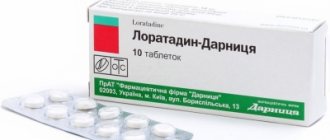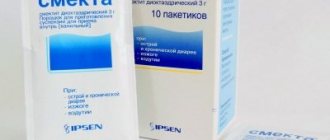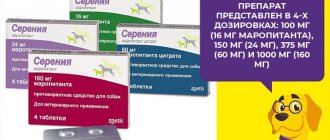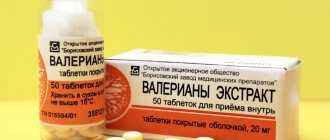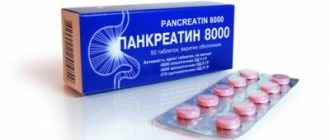Recommended dosage
Always seek professional advice from your veterinarian before using Zyrtec. Read the instructions carefully and make sure that cetirizine is the only active ingredient.
| For treatment | Dosage |
| Atopic dermatitis | 1.1 mg/kg every 24 hours |
| Allergic dermatitis | 1.1 mg/kg every 12 hours |
Some veterinarians prefer to treat atopic dermatitis with a total dose of 5-10 mg once daily. The drug is taken with food or alone.
Example:
for a dog weighing 22.6 kg: with allergic dermatitis, 25 mg twice daily can be prescribed; with atopic dermatitis, 5-10 mg can be prescribed once a day.
The most popular medications for allergies in dogs
Currently, various drugs for allergies in dogs are quite in demand, since, unfortunately, not only people, but also our little brothers suffer from this disease.
Due to hereditary predisposition in certain breeds, prolonged stress, as well as acute and chronic infectious diseases, dogs can react quite painfully to the pollen of certain plants, dog cosmetics, food products (especially cheap commercial dry food), synthetic materials, and certain medications. and household chemicals. Common allergy symptoms in four-legged friends:
- Skin rash.
- Itching.
- Otitis.
- The dog may itch and bite itself.
- Discharge from the eyes.
- The muzzle is swollen.
- Cough.
- Sneeze.
- Strong dog smell.
- Hair falls out.
- Diarrhea.
- Vomit.
Modern veterinary medicine has a rich arsenal of drugs against allergies in dogs. Below is a comparative analysis of the most popular medicines:
| Name of the medical product | Tsetrin | Loratadine |
| Pharmacological group | Second generation antihistamine | Antiallergic antihistamine drug |
| Active substance | Cetirizine | Loratadine |
| Operating principle | Completely eliminates at the cellular level the process of development of an allergic reaction in a dog. Has an anti-inflammatory effect. | Blocking histamine H11 receptors helps eliminate itching, swelling and other manifestations of allergies |
| What does it cure? | Any form of allergy | Drug, food, insect allergies, rhinitis and urticaria |
| Dosage | ¼ - ½ tablet | As prescribed by the treating aibolit |
| Duration of admission | Approximately several months, always determined by a veterinarian. | 10-15 days |
| Release form | 10 mg tablets | Pills |
| Possible side effects | Mild lethargy and drowsiness, bronchospasm | Very rarely, dry mouth and vomiting are possible |
| Contraindications | Pregnancy, lactation, respiratory and kidney ailments. | Pregnancy and lactation, lactose intolerance, renal failure. |
| Overdose | Headache, drowsiness, tachycardia |
| Name of the medical product | Prednisolone | Suprastin |
| Pharmacological group | Anti-inflammatory, anti-shock and anti-allergenic medicine, glucocorticoid | First generation antihistamine |
| Active substance | Cortisone | Chloropyramine hydrochloride |
| Operating principle | Replenishes the lack of cortisone hormones, which are secreted by the dog’s adrenal glands. | Blocking H1-histamine receptors, eliminating itching and soothing effect |
| What does it cure? | Various types of allergies | Various types of allergies, asthma and before vaccinations |
| Dosage | Depending on the age and weight of the pet, as well as its illness | In tablets - 2 mg per 1 kg of pet's weight. In ampoules - depending on the weight of the animal |
| Duration of admission | About 2 weeks | Always determined by a veterinarian |
| Release form | Injections, tablets and ointment | Tablets and ampoules |
| Possible side effects | Decreased immunity, weight gain, development of mental, bone and skin ailments | Drowsiness and lethargy |
| Contraindications | Psychoses, diabetes mellitus, ulcers, osteoporosis, hypertension, nephritis | Puppies up to 1 month old, pets with kidney disease |
| Overdose | Reducing the canine body's ability to produce corticosteroids on its own | Increased anxiety, dry mouth, seizures, fixed pupils and increased activity |
| Name of the medical product | Zyrtec | Tavegil |
| Pharmacological group | Metabolite of hydroxyzine | Long-acting antihistamine veterinary drug |
| Active substance | Cetirizine dihydrochloride | Clemastine |
| Operating principle | Facilitates allergic reactions, relieves exudate and itching | Elimination of spasm of smooth muscle organs, itching, as well as tissue swelling. Mild sedative effect |
| What does it cure? | Urticaria, rhinitis, allergic conjunctivitis | Allergic reactions to animal or insect bites, as well as taking certain medications, rhinitis and dermatitis |
| Dosage | Determined by a veterinarian-allergist | |
| Duration of admission | No more than 4 weeks | About 10 days |
| Release form | 10 mg tablets | Tablets and ampoules |
| Possible side effects | Diarrhea | Dry mouth and constipation |
| Contraindications | Lactation, renal failure, intolerance to Zyrtec components | Hypersensitivity to veterinary components, young puppies, lactation period |
| Overdose | Increased fatigue, dizziness, urinary retention, tachycardia, anxiety | Dry mouth, tachycardia, convulsions, dilated pupils |
Breeders and ordinary dog owners should clearly understand that medications for allergies in dogs can only be prescribed by the treating veterinarian-allergist. Self-medication in most cases causes an even greater deterioration of the dog’s condition, even death.
In each specific case, when prescribing a course of treatment and determining the dosage of veterinary medications, the type of allergy, concomitant ailments of the dog, the degree of allergic reactions, the age and past illnesses of the four-legged patient, his breed, as well as other individual characteristics of the pet are taken into account.
Thus, the table clearly demonstrates that each medicine treats only certain ailments.
You should strictly adhere to the dosages of veterinary medications established by Aibolit. In case of an overdose, you should definitely notify your dog’s doctor and provide your pet with first aid - give him a sorbent to drink or rinse his stomach. For antihistamines, there is a rule - it is better to under-deliver than over-deliver.
It will be useful for caring owners to know about all the tablets and injections that, for one reason or another, are contraindicated for their dogs and under no circumstances use them to treat their pets.
If, when taking any medicine, the “ball” or “tuzik” experienced a lot of side effects that brought considerable suffering to the pet, you should also notify the veterinarian so that he can give appropriate recommendations on this matter.
Before using any allergy medication in dogs, dog owners should first read the instructions. You will also need to make sure that the medicine is not expired. Otherwise, this veterinary remedy will be unsuitable for treating a four-legged friend, as it can only harm the furry patient.
Is it safe for dogs?
Cetirizine has been shown to be well tolerated in dogs, but based on its use in humans, caution (or avoid use entirely) is recommended when treating dogs with liver or kidney problems. If your dog has severe liver or kidney problems, use Omega-3, which improves itching symptoms in about 25% of dogs with atopic dermatitis.
Cetirizine does not cross the blood-brain barrier (the physiological barrier between the circulatory system and the central nervous system) in large quantities, causing sedative effects less frequently than most other popular antihistamines.
Safety rules for use
Follow the safety rules when treating animals with cetirizine:
- do not give the medicine yourself, without a veterinarian’s prescription;
- use products containing only cetirizine as the only active ingredient;
- use caution or avoid use of the drug entirely when treating dogs with kidney or liver disease;
- Consider safer natural remedies such as Omega-3 for itch relief.
To avoid oversedation, try not to give any other drugs that depress the central nervous system. These are medications that contain benzodiazepines and are used to treat anxiety or insomnia - diazepam, alprazolam, and Ativan.
Overdose
Overdoses are unlikely to be dangerous given that control animals were given the drug at levels up to 220 times higher than the human dose. However, if you suspect your dog has overdosed, you should contact your veterinarian immediately for advice.
If your dog has taken a medicine that contains pseudoephedrine (such as Zyrtec-D), you should seek emergency veterinary attention. Just two tablets (240 mg of pseudoephedrine) can kill a small dog.
What causes allergies in animals?
The reasons for this reaction are completely similar to ours:
- individual components of the diet;
- dust, pollen;
- mold;
- parasites on the skin of an animal;
- shampoos and other detergents, even hygiene compositions;
- and much more.
To determine the exact allergen, it is imperative to seek advice and appropriate examination from a veterinarian. By the way, it is also mandatory for a doctor to prescribe medicine for dogs. Do not self-medicate under any circumstances - this is fraught with very serious, sometimes irreparable consequences.
The most important thing about Cetrina for dogs
The most popular drugs for allergies in dogs Currently, various drugs for allergies in dogs are quite in demand, since, unfortunately, not only people, but also our little brothers suffer from this disease.
Due to hereditary predisposition in certain breeds, prolonged stress, as well as acute and chronic infectious diseases, dogs can react quite painfully to the pollen of certain plants, dog cosmetics, food products, especially cheap commercial dry food, synthetic materials, certain medications and products household chemicals.
Common allergy symptoms in four-legged friends:. Modern veterinary medicine has a rich arsenal of drugs against allergies in dogs. Below is a comparative analysis of the most popular medicines:. Breeders and ordinary dog owners should clearly understand that medications for allergies in dogs can only be prescribed by the treating veterinarian-allergist.
Self-medication in most cases causes an even greater deterioration of the dog’s condition, even death. In each specific case, when prescribing a course of treatment and determining the dosage of veterinary medications, the type of allergy, concomitant ailments of the dog, the degree of allergic reactions, the age and past illnesses of the four-legged patient, his breed, as well as other individual characteristics of the pet are taken into account.
You should strictly adhere to the dosages of veterinary medications established by Aibolit. In case of an overdose, you should definitely notify your dog’s doctor and provide your pet with first aid - give him a sorbent to drink or rinse his stomach. For antihistamines, there is a rule - it is better to under-deliver than over-deliver. It will be useful for caring owners to know about all the tablets and injections that, for one reason or another, are contraindicated for their dogs and under no circumstances use them to treat their pets.
Before using any allergy medication in dogs, dog owners should first read the instructions. You will also need to make sure that the medicine is not expired. Otherwise, this veterinary remedy will be unsuitable for treating a four-legged friend, as it can only harm the furry patient.
Efficiency and principle of action Due to the fact that Vermox is a drug for treating people, dogs or cats….
How to notice papillomaIf the virus entered the body of a dog with good health and good living conditions,... Treatment of staphylococcus Treatment of staphylococcus in dogs is carried out comprehensively. First of all, it is necessary to destroy the pathogen. For this…. Causes of the condition If you suspect urinary incontinence, it would be best to refrain from punishing….
Animal Liberty Articles and reviews. Common allergy symptoms in four-legged friends: Skin rash. The dog may itch and bite itself. Discharge from the eyes. The muzzle is swollen. Strong dog smell.
Hair falls out. Below is a comparative analysis of the most popular medicines: Name of the drug Cetrin Loratadine Pharmacological group Antihistamine of the second generation Anti-allergic antihistamine Active ingredient Cetirizine Loratadine Principle of action Completely eliminates at the cellular level the process of development of an allergic reaction in a dog.
Has an anti-inflammatory effect. Blocking histamine H11 receptors helps eliminate itching, swelling and other manifestations of allergies. What does it treat? Pregnancy and lactation, lactose intolerance, renal failure. Overdose Headache, drowsiness, tachycardia Name of the medicinal product Prednisolone Suprastin Pharmacological group Anti-inflammatory, anti-shock and anti-allergenic medicine, glucocorticoid First generation antihistamine Active ingredient Cortisone Chloropyramine hydrochloride Principle of action Replenishes the deficiency of cortisone hormones, which is secreted by the dog’s adrenal glands Blocking H1-histamine receptors, Elimination of itching and sedative effect What treats?
Various types of allergies Various types of allergies, asthma and before vaccinations Dosage Depending on the age and weight of the pet, as well as its illness In tablets - 2 mg per 1 kg of pet's weight. In ampoules - depending on the weight of the animal Duration of administration About 2 weeks Always determined by a veterinarian Release form Injections, tablets and ointment Tablets and ampoules Possible side effects Decreased immunity, weight gain, development of mental, bone and skin ailments Drowsiness and lethargy Contraindications Psychoses, diabetes mellitus, ulcers, osteoporosis, hypertension, nephritis Puppies up to 1 month of age, pets with kidney disease Overdose Reduced canine body ability to independently produce corticosteroids Increased anxiety, dry mouth, convulsions, pupillary immobility and increased activity Name of the medicinal product Zirtek Tavegil Pharmacological group Metabolite of hydroxyzine Long-acting antihistamine veterinary drug Active ingredient Cetirizine dihydrochloride Clemastine Principle of action Facilitates allergic reactions, relieves exudate and itching Eliminates spasms of smooth muscle organs, itching, and tissue swelling.
Mild sedative effect What treats? Urticaria, rhinitis, allergic conjunctivitis Allergic reactions to animal or insect bites, as well as taking certain medications, rhinitis and dermatitis Dosage Determined by a veterinarian-allergist Duration of use No more than 4 weeks About 10 days Release form Tablets 10 mg Tablets and ampoules Possible side effects effects Diarrhea Dry mouth and constipation Contraindications Lactation, renal failure, intolerance to the components of Zyrtec Hypersensitivity to the components of the veterinary drug, young puppies, lactation period Overdose Increased fatigue, dizziness, urinary retention, tachycardia, anxiety Dry mouth, tachycardia, convulsions, dilated pupils For breeders and ordinary dog owners should clearly understand that medications for allergies in dogs can only be prescribed by the treating veterinarian-allergist.
Thus, the table clearly demonstrates that each medicine treats only certain ailments. Useful materials: Vermox for dogs dosage Efficiency and principle of action Due to the fact that Vermox is a drug for treating people, a dog or cat…. Papillomas in dogs photo How to notice papillomaIf the virus entered the body of a dog with good health and good living conditions,... Staphylococcus in dogs Treatment of staphylococcus Treatment of staphylococcus in dogs is carried out comprehensively.
Urinary incontinence in dogs Causes of the condition When you suspect urinary incontinence, it would be best to refrain from punishing….
New entries. Completely eliminates at the cellular level the process of development of an allergic reaction in a dog. Blocking histamine H11 receptors helps eliminate itching, swelling and other manifestations of allergies. In tablets - 2 mg per 1 kg of pet's weight. In ampoules - depending on the weight of the animal. Increased anxiety, dry mouth, convulsions, fixed pupils and increased activity. Elimination of spasm of smooth muscle organs, itching, as well as tissue swelling.
Mild sedative effect. Allergic reactions to animal or insect bites, as well as taking certain medications, rhinitis and dermatitis.
Hypersensitivity to veterinary components, young puppies, lactation period. Increased fatigue, dizziness, urinary retention, tachycardia, anxiety.
Feasibility of application?
If you notice obvious signs of an allergic reaction in your pet and see that he is suffering very much, but there is no way to take him to a veterinarian right away (the animal ate something at the dacha, or, alternatively, berries from the garden - strawberries, wild strawberries), then you can Give a strictly limited dose of this medicine.
Ideally, it is necessary to carefully analyze the reasons for what happened and draw the right conclusions, in particular:
- change the animal’s diet, excluding some exotic fruits, for example, pineapples and apricots, replacing them with products familiar to our country (believe me, carrots, beets and cucumbers are no worse than overseas delicacies);
- look at the animal, perhaps it is tormented by bloodsucking parasites (there are a great variety of means to eliminate them on the market and in stores these days);
- change the shampoo (some people bathe their animals with expensive human detergents, thinking that this will only improve their coat and add shine, this approach is misleading)
